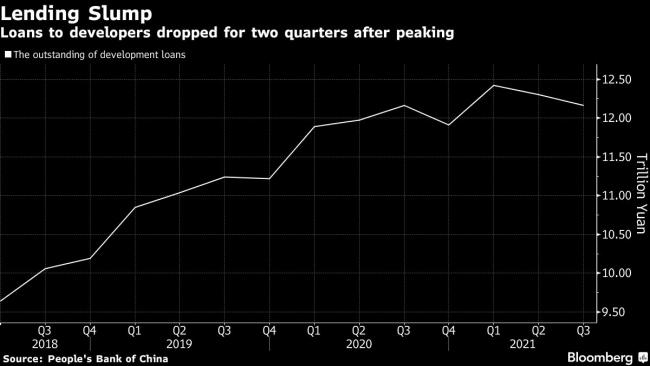(Bloomberg) -- China called on banks to boost real estate lending in the first quarter and eased a key debt restriction for developers, a sign that authorities are becoming increasingly concerned about the industry’s liquidity crisis.
In previously unreported window guidance issued last month, regulators told banks to step up lending to developers after at least two quarters of consecutive declines, people familiar with the matter said, asking not to be identified discussing private information. At the same time, borrowing by major property firms used to fund mergers and acquisitions will no longer be counted toward the “three red lines” metrics that limit debt, said the people.
Regulators are dialing back the intensity of a multi-year crackdown on the nation’s real estate sector as they try to engineer a soft landing after years of debt-fueled expansion. Developers such as China Evergrande Group and Kaisa Group Holdings have been missing payments on bonds and other types of financing such as trust products, posing a major challenge to growth in the world’s second-largest economy as well as the nation’s social stability.
The move to ease funding for M&A comes as developers are struggling to sell assets to ease the cash squeeze. While banks are willing to provide loans for deals, developers are finding it hard to seal any agreements, one of the people said. Cailian first reported on the M&A loan easing.
“Project M&A is the most effective market-oriented way for the real estate sector to resolve risks,” Lan Zou, an official at the People’s Bank of China, said at a press conference last week. “Many stronger developers showed a willingness to buy distressed assets from cash-strapped peers.”
Shimao Group Holdings, a bellwether for financial contagion in the property industry, suffered its biggest-ever bond rout on Thursday after a creditor said one of the developer’s units defaulted on a local loan. The unit failed to pay 645 million yuan ($101 million) of a total 792 million yuan due by Dec. 25, according to a notice sent to investors by China Credit Trust Co.
Just this month alone, the industry will need to find at least $197 billion to cover maturing bonds, coupons, trust products and deferred wages to millions of migrant workers, according to Bloomberg calculations and analyst estimates. Beijing has urged builders like China Evergrande to also meet payrolls by month-end in order to avoid the risk of social unrest.
Meanwhile, bank loans to developers slid by 120 billion yuan in the second quarter and by 140 billion yuan in the third quarter. It’s unclear whether regulators have a specific target for the size of increase in real estate lending for each bank.
Since October, banks have also been accelerating mortgage approvals to home buyers. Lenders were also permitted to apply to sell securities backed by residential mortgages to free up loan quotas, easing a ban imposed early last year.
Chinese banks had more than 51.4 trillion yuan of outstanding loans to the real estate sector as of September. The exposure was more than any other industry, and accounted for about 27% of the nation’s total lending, according to official data.
Signs that regulators are seeking ways to ease the industry’s troubles has revived some optimism. The CSI 300 Real Estate Index rallied 4.9% on Friday, taking this week’s gain to 8%, on hopes of further policy easing.
But many smaller firms are still likely to struggle to raise cash. The offshore dollar bond market remains effectively shut for refinancing, a situation that HSBC Holdings Plc (LON:HSBA) analysts predict will continue for at least another six months. Only a handful of the strongest private-sector builders have recently tapped the interbank credit market onshore, while low stock valuations limit the scope for equity financing.
©2022 Bloomberg L.P.
